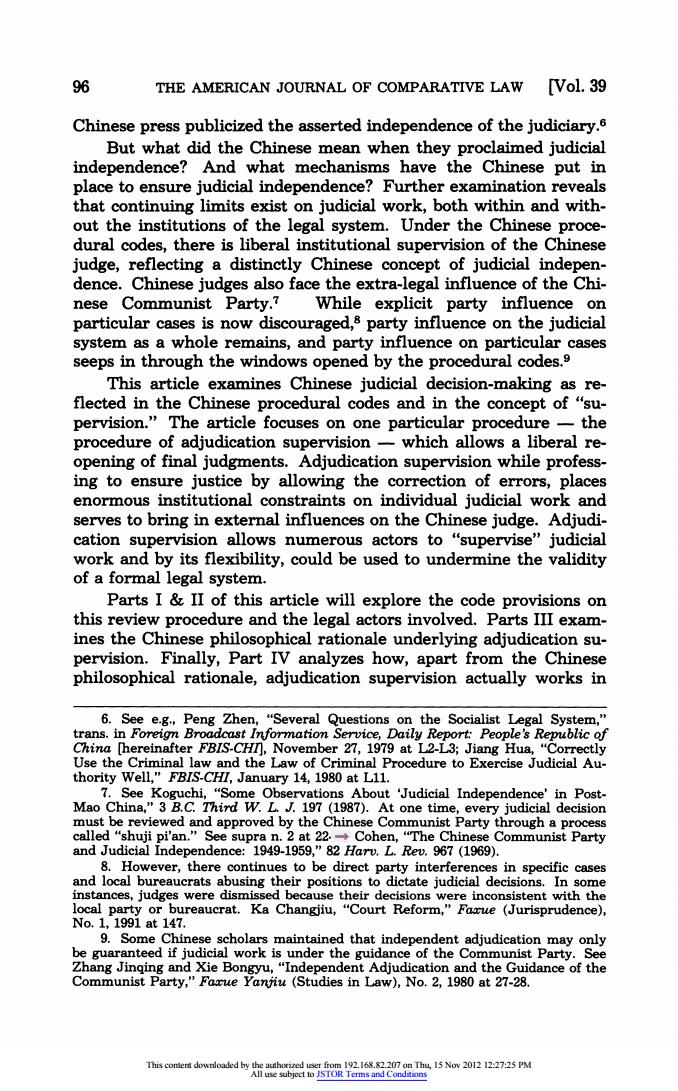正在加载图片...

96 THE AMERICAN JOURNAL OF COMPARATIVE LAW [Vol.39 Chinese press publicized the asserted independence of the judiciary.6 But what did the Chinese mean when they proclaimed judicial independence?And what mechanisms have the Chinese put in place to ensure judicial independence?Further examination reveals that continuing limits exist on judicial work,both within and with- out the institutions of the legal system.Under the Chinese proce- dural codes,there is liberal institutional supervision of the Chinese judge,reflecting a distinctly Chinese concept of judicial indepen- dence.Chinese judges also face the extra-legal influence of the Chi- nese Communist Party.7 While explicit party influence on particular cases is now discouraged,s party influence on the judicial system as a whole remains,and party influence on particular cases seeps in through the windows opened by the procedural codes.9 This article examines Chinese judicial decision-making as re- flected in the Chinese procedural codes and in the concept of "su- pervision."The article focuses on one particular procedure-the procedure of adjudication supervision-which allows a liberal re- opening of final judgments.Adjudication supervision while profess- ing to ensure justice by allowing the correction of errors,places enormous institutional constraints on individual judicial work and serves to bring in external influences on the Chinese judge.Adjudi- cation supervision allows numerous actors to "supervise"judicial work and by its flexibility,could be used to undermine the validity of a formal legal system. Parts I II of this article will explore the code provisions on this review procedure and the legal actors involved.Parts III exam- ines the Chinese philosophical rationale underlying adjudication su- pervision.Finally,Part IV analyzes how,apart from the Chinese philosophical rationale,adjudication supervision actually works in 6.See e.g.,Peng Zhen,"Several Questions on the Socialist Legal System," trans.in Foreign Broadcast Information Service,Daily Report:People's Republic of China [hereinafter FBIS-CHI,November 27,1979 at L2-L3;Jiang Hua,"Correctly Use the Criminal law and the Law of Criminal Procedure to Exercise Judicial Au- thority Well,"FBIS-CHI,January 14,1980 at L11. 7.See Koguchi,"Some Observations About 'Judicial Independence'in Post- Mao China,"3 B.C.Third W.L.J.197 (1987).At one time,every judicial decision must be reviewed and approved by the Chinese Communist Party through a process called“shuji pi'an.”See supra n.2at22.→Cohen,“The Chinese Communist Party and Judicial Independence:1949-1959,"82 Harv.L.Rev.967 (1969). 8.However,there continues to be direct party interferences in specific cases and local bureaucrats abusing their positions to dictate judicial decisions.In some instances,judges were dismissed because their decisions were inconsistent with the local party or bureaucrat.Ka Changjiu,"Court Reform,"Faxue (Jurisprudence), No.1,1991at147, 9.Some Chinese scholars maintained that independent adjudication may only be guaranteed if judicial work is under the guidance of the Communist Party.See Zhang Jinqing and Xie Bongyu,"Independent Adjudication and the Guidance of the Communist Party,"Faxue Yanjiu (Studies in Law),No.2,1980 at 27-28. This content downloaded by the authorized user from 192.168.82.207 on Thu,15 Nov 2012 12:27:25 PM All use subject to JSTOR Terms and Conditions96 THE AMERICAN JOURNAL OF COMPARATIVE LAW [Vol. 39 Chinese press publicized the asserted independence of the judiciary.6 But what did the Chinese mean when they proclaimed judicial independence? And what mechanisms have the Chinese put in place to ensure judicial independence? Further examination reveals that continuing limits exist on judicial work, both within and without the institutions of the legal system. Under the Chinese procedural codes, there is liberal institutional supervision of the Chinese judge, reflecting a distinctly Chinese concept of judicial independence. Chinese judges also face the extra-legal influence of the Chinese Communist Party.7 While explicit party influence on particular cases is now discouraged,8 party influence on the judicial system as a whole remains, and party influence on particular cases seeps in through the windows opened by the procedural codes.9 This article examines Chinese judicial decision-making as reflected in the Chinese procedural codes and in the concept of "supervision." The article focuses on one particular procedure - the procedure of adjudication supervision - which allows a liberal reopening of final judgments. Adjudication supervision while professing to ensure justice by allowing the correction of errors, places enormous institutional constraints on individual judicial work and serves to bring in external influences on the Chinese judge. Adjudication supervision allows numerous actors to "supervise" judicial work and by its flexibility, could be used to undermine the validity of a formal legal system. Parts I & II of this article will explore the code provisions on this review procedure and the legal actors involved. Parts III examines the Chinese philosophical rationale underlying adjudication supervision. Finally, Part IV analyzes how, apart from the Chinese philosophical rationale, adjudication supervision actually works in 6. See e.g., Peng Zhen, "Several Questions on the Socialist Legal System," trans. in Foreign Broadcast Information Service, Daily Report: People's Republic of C7hina [hereinafter FBIS-CHI], November 27, 1979 at L2-L3; Jiang Hua, "Correctly Use the Criminal law and the Law of Criminal Procedure to Exercise Judicial Authority Well," FBIS-CHI, January 14,1980 at Lll. 7. See Koguchi, "Some Observations About 'Judicial Independence' in PostMao China," 3 B.C. Third W. L. J. 197 (1987). At one time, every judicial decision must be reviewed and approved by the Chinese Communist Party through a process called "shuji pi'an." See supra n. 2 at 22-23; Cohen, "The Chinese Communist Party and Judicial Independence: 1949-1959," 82 Harv. L. Rev. 967 (1969). 8. However, there continues to be direct party interferences in specific cases and local bureaucrats abusing their positions to dictate judicial decisions. In some instances, judges were dismissed because their decisions were inconsistent with the local party or bureaucrat. Ka Changjiu, "Court Reform," Faxue (Jurisprudence), No. 1, 1991 at 147. 9. Some Chinese scholars maintained that independent adjudication may only be guaranteed if judicial work is under the guidance of the Communist Party. See Zhang Jinqing and Xie Bongyu, "Independent Adjudication and the Guidance of the Communist Party," Faxue Yanjiu (Studies in Law), No. 2, 1980 at 27-28. This content downloaded by the authorized user from 192.168.82.207 on Thu, 15 Nov 2012 12:27:25 PM All use subject to JSTOR Terms and Conditions